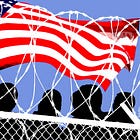RFK Jr.’s Civil Rights Plan is about Rebuilding All Devastated American Communities
By Daniel Kovalik, The Kennedy Beacon
By Daniel Kovalik, The Kennedy Beacon
A pair of articles by Diana Glebova in the New York Post have caused confusion about Robert F. Kennedy Jr.’s views on reparations for the descendants of Black slaves. The first article ran with the headline “RFK Jr. comes out in favor of reparations, carving out lane to Biden’s left,” which, though strictly true, may have been misleading. A reparation can be a public apology or any other form of redress that acknowledges harm done. The same article notes under his photo, “RFK Jr. has said he would be against direct cash payments.”
Nevertheless, as Aila Slisco reports in Newsweek, there were multiple conservative voices chiming in to criticize Kennedy’s “race-based reparations” following the publication of that article.
Eight days later, Glebova followed up with “RFK Jr. quietly changes stance on reparations after major blowback,” showing screenshots of the Kennedy campaign’s newly launched webpage on “Racial Healing.” Apparently after the first Post article appeared, a revision may have been made deleting the phrase “these programs complement direct redress payments or tax credits.” Making payments to individuals would be inconsistent with the detailed plan that Kennedy presented in an interview with Math Offa included in the first Post article. The webpage revision seems to have been a correction or a clarification.
In fact, Kennedy has been consistent about his plans for “Racial Healing” for years. As he discussed in that interview, he does not think cash payments to individuals will heal the damage done to Black communities, and he wants to create programs for communities based on need not skin color.
As explained on the “Racial Healing” page, Kennedy has prepared an eight-point civil rights plan which “appeal[s] not to guilt and blame, but to the conscience of Americans of all races who want to repair the wounds of history.” Black Americans will especially benefit from Kennedy’s need-based program, given that their communities face disproportionate challenges:
Nearly 60 years after the Civil Rights Act, the condition of Black people in America is better in many respects. However, in terms of income, wealth, education, infant mortality, home ownership, incarceration, health, and life expectancy, they still lag behind the rest of the population. Robert F. Kennedy, Jr. believes that this unacceptable situation is the result of the unhealed legacy of racism in this country. We must take direct action to remedy it – not only for the sake of Black people, but for the wellbeing of the entire nation.
Targeting Shattered Communities for Repair
First and foremost, Kennedy is proposing Targeted Community Repair, which takes into account the reality that “during Jim Crow, Black banks, businesses, hospitals, schools, and farms were targeted for destruction. Racists knew that without these, the Black community had no chance of building wealth.” Therefore – while making it clear that all blighted communities will receive assistance, without regard to race – under his plan, the federal government will set aside funding “to rebuild Black infrastructure” in communities intentionally destroyed during the days of Jim Crow.
Kennedy knows a lot about rebuilding shattered communities, having finished the work his father started in 1966 to rebuild the devastated Bedford-Stuyvesant community in Brooklyn, New York. For 20 years, as the Daily News notes, Kennedy served on the board of the Bedford-Stuyvesant Restoration Corporation, which oversaw the community’s restoration. In addition to managing housing and commercial properties, this organization “also provides job training and programs for youth and was a national model for other community development groups.” Touring the area 35 years later, RFK Jr. stated, “In 1966, I walked the streets with my dad and saw boarded-up stores.… Today, the streets are like a market bazaar. That’s good for all of New York.”

In response to Republican attacks suggesting that his plan is race based, Kennedy tweeted that
my policy of Targeted Community Repair is not the same as race-based reparations. The program will make capital and resources available to the poorest and most desperate communities in America. These include inner cities, the rust belt, Appalachia, the devastated towns of the farm belt, etc. Yes, because Black people are disproportionately poor, this program will benefit them disproportionately. But the criteria will be indicators like poverty, addiction rates, violence, etc. Not skin color.
Criminal Justice Reform
In pursuing a Civil Rights agenda, Kennedy’s plan will also take on much-needed prison reform.
As explained on the campaign’s “Racial Healing” page, Kennedy will “undo the legacy of the 1994 crime bill that disfavors African Americans.” He supports early release for nonviolent offenders and “reorient[ing] the prison system around rehabilitation rather than punishment.”
In short, Kennedy will roll back criminal justice policies put in place under President Bill Clinton and supported by then senator Joe Biden – policies that, quite shamefully, have helped make the United States the most incarcerated nation on earth, both in absolute numbers imprisoned (over 2 million in 2018) and in proportion to the population, as reported by CNN.
Kennedy’s campaign promises that his “policy will be tough in the sense of keeping violent people where they can do no further harm, but generous in recognizing the fundamental desire of most human beings to live meaningful lives and contribute to society.”
Responding to the demands of protesters after the police killing of George Floyd in 2020, Kennedy also proposes police reforms that “will reorient police to serve, not occupy, Black communities” and “keep neighborhoods safe rather than harassing their residents.” Under the Kennedy administration, the federal government will “work with localities to change police culture, with pro-community incentives, training in de-escalation, and cooperation with neighborhood organizations.”
The Working Class and Racial Justice
In addition, Kennedy proposes a comprehensive plan to uplift the working class and the working poor. From my own point of view as a decades-long labor lawyer for the United Steelworkers union, I am pleasantly surprised, inspired, and pleased just to see a candidate refer to the US “working class” – a term largely excised from the American lexicon in favor of the more sanitized term “middle class,” which purposely does not capture the struggle of people who work hard just to survive in this country.
This part of Kennedy’s program will provide workers a $15 minimum wage, tax credits, child-care subsidies, and home-buying programs with federally backed 3% mortgages to first-time home buyers. While these forms of assistance will be provided to all working people, Kennedy again emphasizes that, because Black people are “disproportionately represented among the working class,” these “policies to uplift working people will disproportionately help the Black community” and “millions of Black families.”
Education
Kennedy also has a plan for our nation’s rapidly declining schools. As his campaign page notes, “Black children bear the brunt of the shameful decrepitude of the schools in the cities and inner suburbs.” Kennedy’s policy team is exploring ways to revive these schools while supporting parents’ ability to choose other options.
In addition, Kennedy has been an outspoken advocate of providing affordable college education and has promised to “galvanize public support to pressure Congress … [to] legislate meaningful relief” for students in serious debt. He has been very critical of President Biden for only pretending to put forward student loan forgiveness, stating that “Biden knew his plan wouldn’t survive a legal challenge. His plan gave the appearance of action, while accomplishing nothing.”
Youth Vocational Training
Along with education reform, Kennedy has a plan for youth which will address the reality that “in America’s most devastated communities, many of them heavily Black, young people have few pathways and little hope to escape their situation.” He promises to “expand youth programs to make them available to every young person who wants to learn skills while serving society, the environment, the sick, the elderly, and so on.”
Kennedy wisely emphasizes vocational training. As even Forbes magazine has recognized, in a 2015 article titled “Why We Desperately Need To Bring Back Vocational Training In Schools,” such training, which used to be a staple of the American education system, has been largely abandoned in recent decades, much to the detriment of many Americans who cannot afford a four-year college degree or for whom such a degree is not well suited. As the article’s author, Nicholas Wyman, explains:
The U.S. economy has changed. The manufacturing sector is growing and modernizing, creating a wealth of challenging, well-paying, highly skilled jobs for those with the skills to do them. The demise of vocational education at the high school level has bred a skills shortage in manufacturing today.
Healing the Drug Abuse Epidemic
In addition, Kennedy has a plan for dealing with this country’s terrible crisis of addiction. As his campaign page relates, and as Kennedy understands well from personal experience, “Addiction afflicts all ethnic groups in America, but is especially devastating in conjunction with the unique legacy of racism and trauma faced by Black people.” He plans to launch a nationwide network of low-cost or free addiction healing centers on organic farms, available to anyone who sincerely wants to heal.
Having himself recovered years ago from both drug and alcohol addiction, and having been given a number of second chances after incidents related to his addiction, Kennedy has helped others find redemption. As he explains, at Riverkeeper, the environmental law group he was a part of for many years, “I made a point of hiring people who were felons, who were convicted, who had served their time in prison.… I believe in redemption. I don’t think we can dismiss human beings, no matter what they did earlier on in their lives.”
Border Issues
Finally, part of Kennedy’s civil rights plan includes a free federal ID for all. As his campaign page explains, “Today, many marginalized people lack a government-issued ID, locking them out of the banking system, schools, and many other social institutions. Robert F. Kennedy Jr. will make free passport cards available to anyone who wants one.”
Such IDs are also critical to maintain the voting rights of marginalized people. Many former Jim Crow states, as well as others, continue to to disenfranchise racial minorities and the poor by requiring or seeking to require capricious and draconian standards of identification at the polls.
The great Black poet Langston Hughes once said, “America never was America to me” because of the impact of racial discrimination and segregation. For many people in America today, America is still not America to them either – not just because of their race but also because of their dire economic struggles in a country where making ends meet is becoming a practical impossibility.
Kennedy’s expansive and inclusive civil rights plan is intended to help all Americans realize the promises of America as envisioned by our Founding Fathers and by great leaders such as Abraham Lincoln, FDR, and JFK.










Good job on explaining and clarifying RFK’s reparations & civil rights plan! Also need to add his plans on issues of medical, mental health, drug addiction & homelessness…! Really excited about the future of the USA with RFK!!
Thank you so much for clarifying RFK Jr’s stance on reparations and being transparent about what was posted on his campaign website. I had read it before it was taken down and saw how it could be misinterpreted.